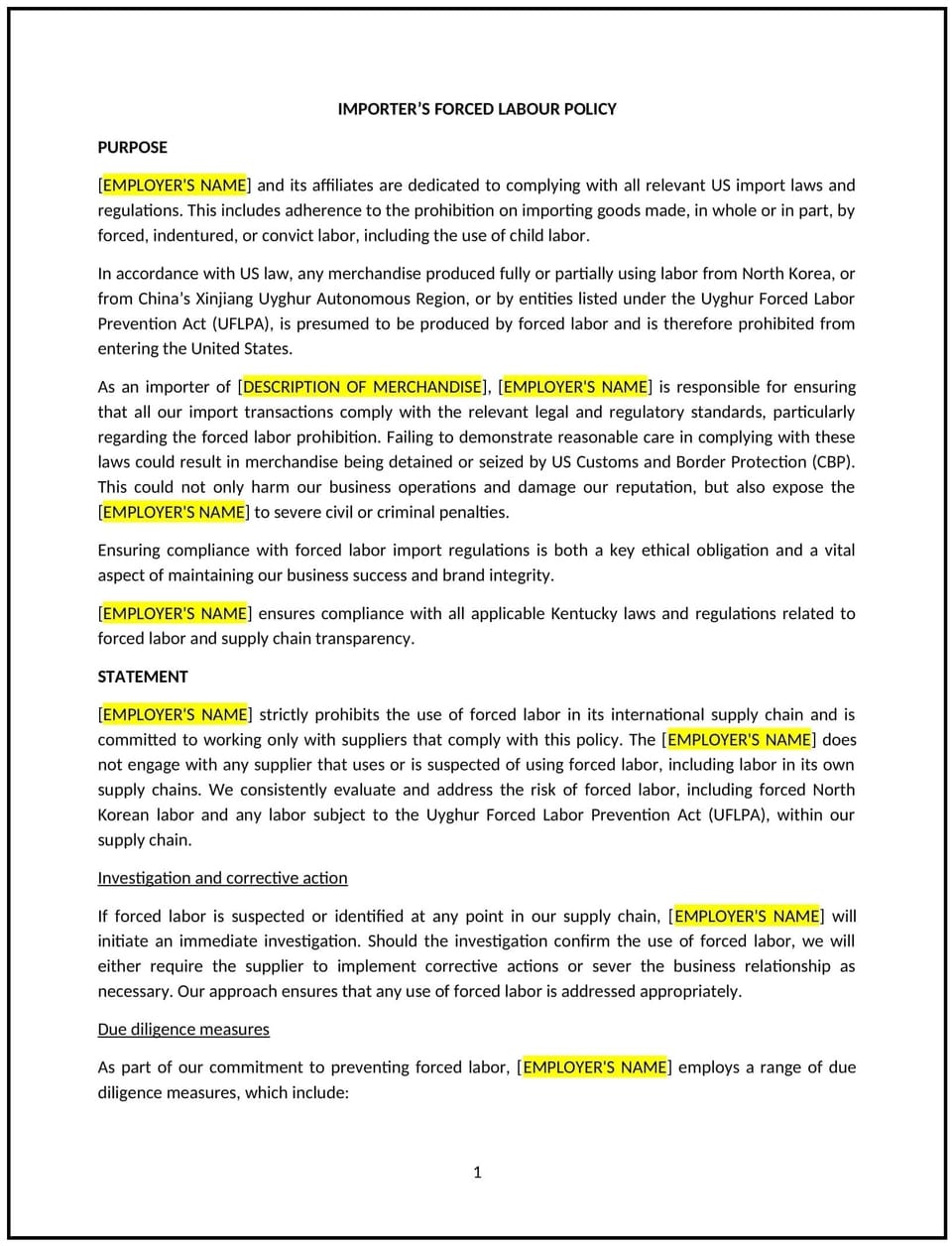Importer's forced labour policy (Kentucky): Free template

Importer's forced labour policy (Kentucky)
An importer's forced labour policy outlines the steps Kentucky businesses take to prevent forced labour and human trafficking in their supply chains, ensuring that all goods imported into the business are sourced ethically. This policy defines the company’s commitment to combating forced labour and protecting workers’ rights throughout its supply chain.
By adopting this policy, businesses can help prevent exploitation, align with ethical sourcing standards, and mitigate reputational and legal risks.
How to use this importer's forced labour policy (Kentucky)
- Define forced labour: Clearly define what constitutes forced labour, including coerced work, exploitation, and trafficking, and provide examples of situations where forced labour may occur.
- Set supplier expectations: Outline the requirements that suppliers must meet regarding labour practices, including adherence to anti-forced labour standards and compliance with applicable international, federal, and state laws.
- Conduct due diligence: Establish procedures for vetting and auditing suppliers to ensure they meet the business’s ethical standards and do not use forced labour in their operations.
- Monitor supply chains: Implement a system for ongoing monitoring and reporting to track the supply chain for signs of forced labour, using audits, certifications, and third-party assessments.
- Address incidents: Detail the steps to take if forced labour is discovered in the supply chain, including terminating relationships with non-compliant suppliers and reporting the issue to relevant authorities.
- Provide training: Offer training for employees and key stakeholders on recognizing and preventing forced labour and trafficking within the supply chain.
- Encourage transparency: Promote an open dialogue with suppliers and stakeholders about forced labour risks and encourage sharing of information to improve labour practices.
Benefits of using this importer's forced labour policy (Kentucky)
This policy provides several key benefits for Kentucky businesses:
- Reduces legal risks: Helps businesses avoid legal penalties associated with forced labour and human trafficking violations.
- Protects reputation: Demonstrates the business’s commitment to ethical sourcing, which can enhance its reputation with customers, investors, and the public.
- Promotes ethical sourcing: Encourages fair treatment and respect for workers’ rights throughout the supply chain.
- Enhances supplier relationships: Builds trust with suppliers and stakeholders by setting clear, ethical standards for business practices.
- Supports compliance with global standards: Aligns with international frameworks and human rights conventions, promoting ethical business operations on a global scale.
Tips for using this importer's forced labour policy (Kentucky)
- Communicate the policy: Ensure employees and suppliers are aware of the policy and its requirements by integrating it into supplier contracts and sharing it during onboarding.
- Conduct regular audits: Implement frequent audits and inspections to verify that suppliers adhere to forced labour-free standards and maintain transparency.
- Collaborate with stakeholders: Work with NGOs, government bodies, and industry groups to stay informed about best practices for preventing forced labour in the supply chain.
- Provide training: Ensure employees are trained to recognize the signs of forced labour and understand how to report concerns.
- Review periodically: Update the policy regularly to incorporate new laws, regulations, and best practices related to forced labour prevention.
Q: What is the purpose of an importer's forced labour policy?
A: The policy outlines the steps the business will take to prevent forced labour and human trafficking in its supply chain, ensuring that all imported goods are ethically sourced.
Q: How does the business monitor its supply chain for forced labour?
A: The business monitors its supply chain through due diligence, audits, and certifications from suppliers, and it takes action if forced labour is identified.
Q: What actions will the business take if forced labour is discovered in the supply chain?
A: The business will terminate relationships with non-compliant suppliers, report the issue to relevant authorities, and implement corrective actions to address the problem.
Q: Are suppliers required to meet certain standards under this policy?
A: Yes, suppliers must comply with the business’s ethical sourcing standards, which include prohibiting forced labour and trafficking in their operations.
Q: How does the business ensure that suppliers follow the policy?
A: The business conducts regular audits, monitors supplier practices, and requires transparency to ensure compliance with the anti-forced labour policy.
Q: What role do employees play in preventing forced labour?
A: Employees are trained to recognize forced labour risks and are encouraged to report any concerns they may have regarding unethical labour practices.
Q: How often should the importer's forced labour policy be reviewed?
A: The policy should be reviewed periodically to ensure it remains aligned with Kentucky laws, federal regulations, and global best practices for ethical sourcing.
Q: How can the business promote ethical sourcing with its suppliers?
A: The business can promote ethical sourcing by maintaining open communication with suppliers, setting clear expectations, and providing training on forced labour prevention.
This article contains general legal information and does not contain legal advice. Cobrief is not a law firm or a substitute for an attorney or law firm. The law is complex and changes often. For legal advice, please ask a lawyer.


